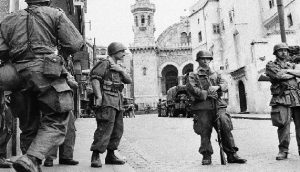13-12-2023
BERLIN/ ALRIERS/ JERUSALEM: On May 7, 1945, Nazi Germany signed the act of military surrender to the Allies. The next day, people all over the world, including in occupied Algeria, took to the streets to celebrate the end of World War II.
 An estimated 134,000 Algerians fought with the Allies and 18,000 of them gave their lives to defeat Germany. And so, on May 8, 1945, in Setif, a city east of Algiers, some 5000 “moslems”, as Algerians were called by the colonial power to erase their national identity, marched in celebration. But they also marched clamouring for the end of over a century-long French colonial rule over their country. French police seized banners and eventually opened fire, killing demonstrators. Clashes erupted with 102 French settlers killed.
An estimated 134,000 Algerians fought with the Allies and 18,000 of them gave their lives to defeat Germany. And so, on May 8, 1945, in Setif, a city east of Algiers, some 5000 “moslems”, as Algerians were called by the colonial power to erase their national identity, marched in celebration. But they also marched clamouring for the end of over a century-long French colonial rule over their country. French police seized banners and eventually opened fire, killing demonstrators. Clashes erupted with 102 French settlers killed.
In the following fortnight, a blood frenzy overtook French authorities and settlers who massacred some 45,000 Algerians. Rural areas around Setif and the town of Guelma believed to be sympathetic to Algerian nationalists were bombarded by the French air force. Settlers avenged their compatriots by hunting down and lynching “the savages”.
To establish themselves in Algeria and legitimize their presence there, the colonists had dehumanized the indigenous population to the extent of perceiving them as nothing more than vermin. This allowed French colonists and their occupation army to kill Algerians in their thousands, with little or no moral qualms.
The Setif massacre brought the colonial power another nine years of relative peace but in the end, it only served to harden the Algerian resolve to be free. On November 1, 1954, they embarked on their ultimate war of resistance against French occupation. After eight years of “a savage war of peace” as British historian Alistair Horne put it,  Algeria won its independence but at a heavy price: The war claimed the lives of some 1.5 million Algerians; some 20 percent of Algeria’s “Moslems”.
Algeria won its independence but at a heavy price: The war claimed the lives of some 1.5 million Algerians; some 20 percent of Algeria’s “Moslems”.
What is happening in Palestine today, predominately in Gaza but also in the West Bank and East Jerusalem, is of course not identical to the events that marked the end of French rule in Algeria. Yet there are many similarities between them, as the modus operandi of most colonial enterprises follows a set pattern.
Colonizers dehumanize indigenous populations to keep them pliant and to justify the use of brutal force against them when they try to resist their subjugation.
They ensure that the colonized are powerless militarily, but often make the mistake of assuming this lack of military prowess also means that they lack the strength and resolve to resist oppression and defeat occupation. When they eventually realize their misjudgment and acknowledge that they cannot sustain their position indefinitely, they intensify their brutality to preserve the status quo for as long as possible. This is what happened in occupied Algeria in the latter years of French rule, and this is what we are witnessing in occupied Palestine today. (Int’l News Desk)
 Pressmediaofindia
Pressmediaofindia




